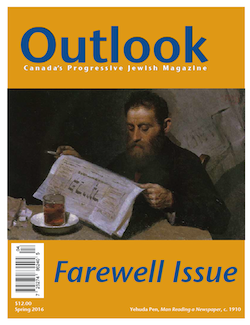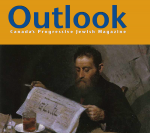The cover of Outlook magazine’s final issue features a painting by Lithuanian artist Yehuda Pen (1854-1937). The newspaper in the image, explains the caption, is Der fraynd (The Friend), which, “founded in 1903, was one of the major Yiddish newspapers of its day before it was closed down in 1913 by czarist censors.” For Outlook – “Canada’s only progressive Jewish periodical” – it wasn’t censors that caused its demise, but the economy, one that has seen many print publications close their doors.
“We have struggled uphill for quite awhile with the difficulties and expenses of sustaining a print publication with a small and specialized – although devoted – readership, and we must finally let go,” writes editor Carl Rosenberg in the magazine’s final issue, the Spring 2016 edition.
 “Looking back, we are proud of having given a home to diverse voices in the left and Jewish communities: liberal Zionist, non- and anti-Zionist, Yiddishist, Marxist, feminist, anarchist, environmentalist, social democratic,” he continues. “We have covered and reflected the Canadian and international scene, including labor struggles, environmental issues, women’s issues, issues of sexuality, gender, human rights and civil liberties. We have hosted lively, often impassioned, debates on many issues, and we hope they have usually been respectful as well.
“Looking back, we are proud of having given a home to diverse voices in the left and Jewish communities: liberal Zionist, non- and anti-Zionist, Yiddishist, Marxist, feminist, anarchist, environmentalist, social democratic,” he continues. “We have covered and reflected the Canadian and international scene, including labor struggles, environmental issues, women’s issues, issues of sexuality, gender, human rights and civil liberties. We have hosted lively, often impassioned, debates on many issues, and we hope they have usually been respectful as well.
“We have upheld a cultural heritage dear to most secular Jews – that of Yiddish language and literature. We have published works by and about a wide variety of Yiddish writers, men and women, and recounted the rich and dynamic history of the secular Yiddish culture that emerged in Eastern Europe a century and a half ago and has played such a large part in modern Jewish history and culture.
“We have remembered one of the greatest crimes in recorded history – the Nazi Holocaust or Shoah against the Jews of Europe, paying tribute to those who resisted against impossible odds. We have tried to draw universal lessons from this monstrosity, speaking out against racism, chauvinism and fanaticism of all kinds. On the Israeli-Palestinian conflict, we have supported the rights of both peoples to exist in peace and equality, while opposing violence on all sides, and we have opposed the decades-long Israeli occupation of the West Bank and Gaza and the systematic Israeli violation of Palestinian human and national rights.”
In an article by Leslie Dyson, managing editor Sylvia Friedman – whose involvement with Outlook goes back 43 years – explains a bit of the publication’s history. While she connected with the magazine in Toronto in 1973, it started in 1963, evolving, writes Dyson, “from an English-language insert in the Vochenblatt (Weekly Paper),” which closed its doors in 1978, “due to the ill-health of its editor, Joshua Gershman, who was also for a time the de facto editor of Outlook, where [Friedman] worked with him.
“In 1979, Friedman announced that she was moving with her family to Vancouver. It seemed that Outlook (known then as Canadian Jewish Outlook) would have to fold. Ben Chud and Hank Rosenthal, progressive Jewish activists in Vancouver, asked if they could jointly take over the role of editor and have Friedman manage the magazine in Vancouver – an arrangement that was accepted.”
The magazine describes itself as “an independent, secular Jewish publication with a socialist-humanist perspective.” Published six times a year, it had collectives in Ottawa, Toronto, Winnipeg and Vancouver. It has had an office in the Peretz Centre for Secular Culture (which used to be called the Vancouver Peretz Institute) since the late 1980s. Rosenberg became assistant editor in 1993 and editor in 1998.
“We didn’t follow a particular policy,” Friedman told Dyson, “but we have been critical of what’s happening in Israel, the States, Canada and B.C. I guess the focus has been on equality and principles of socialism. But even left-leaning governments never received blind support.”
Financed by fundraisers held in Vancouver, Winnipeg and Toronto; subscriptions; and funds bequeathed by “Joseph Zuken (a long-time openly communist city council member in Winnipeg) and Ben Shek (a professor, social justice activist, active member of the Toronto Jewish Folk Choir and regular contributor to Outlook),” making ends meet has always been challenging for Outlook. At its highest, circulation was 3,000 copies in the 1990s.
With older readers literally dying off and younger readers getting their information from the internet, plus constantly increasing printing and mailing costs, publishing the magazine just became too expensive.
The final issue features many comments from readers about what Outlook has meant to them, essays on such topics as the future of the NDP and the state of public broadcasting, and several book reviews.

